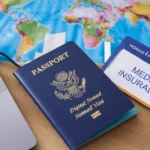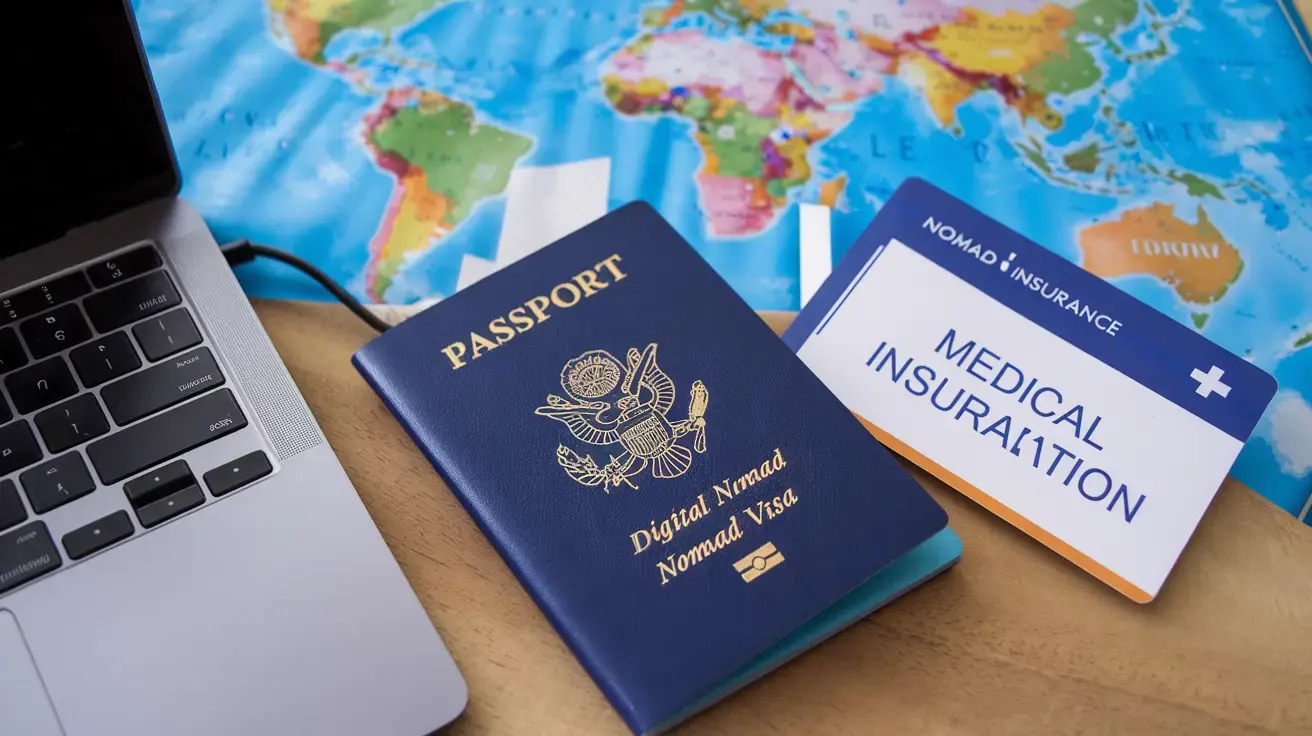You’re living the laptop lifestyle in Bali while your friend is stuck filing taxes in a stuffy office back home. Feels like you’ve hacked the system, right? Until you realize: those digital nomad taxes aren’t going to file themselves.
Nearly 71% of remote workers mistakenly believe they don’t owe taxes to their home country while working abroad. Spoiler alert: the IRS doesn’t care about your Instagram-worthy office view.
This digital nomad tax guide cuts through the confusion of paying taxes while working abroad. No more late-night panic Googling or expensive last-minute accountant calls.
But before you think this is just another boring tax article, let me ask you something: what if you’re actually overpaying thousands in taxes that you could legally avoid?
Key Takeaways
Navigating taxes as a digital nomad isn’t as scary as it sounds once you understand the basics. Here’s what you really need to remember:
- Your tax home matters more than where you work from. Most countries tax based on residency, not where you happen to open your laptop.
- The 183-day rule is your new best friend. Stay in most countries less than 183 days in a calendar year to avoid triggering tax residency.
- You’ll probably still owe taxes back home. U.S. citizens, I’m looking at you—Uncle Sam wants his cut regardless of where you live.
- Digital nomad visas can simplify your tax situation, offering clear rules and sometimes tax incentives, but research the specific requirements for each country.
- Double taxation treaties exist to save your wallet. These agreements between countries prevent you from paying taxes twice on the same income.
- Document everything. Track your days in each country, keep receipts, and maintain proof of your tax home. Your future self will thank you during tax season.
- The Foreign Earned Income Exclusion (FEIE) is gold for U.S. nomads, potentially excluding up to $120,000 of foreign earnings from U.S. taxes in 2025.
- Consider hiring a tax professional who specializes in expat taxes. The peace of mind is worth every penny when dealing with multiple tax jurisdictions.
Remember, tax compliance might seem boring, but it’s way better than facing penalties or legal issues that could derail your nomadic lifestyle.
Do Digital Nomads Have to Pay US Taxes?
The question seems straightforward, but the answer gets complicated fast.
Yes, U.S. citizens and green card holders living abroad as digital nomads generally must pay U.S. taxes on their worldwide income. That’s because the U.S. tax system is based on citizenship, not residency. You could be living in a beach hut in Thailand for years, and Uncle Sam will still expect his cut.
Foreign Earned Income Exclusion (FEIE)
Good news though! You might qualify for the Foreign Earned Income Exclusion. For 2025, this lets you exclude up to $126,500 of foreign earned income from U.S. taxation.
To qualify, you need to:
- Pass either the Physical Presence Test (physically present in foreign countries for 330 days in a 12-month period)
- OR the Bona Fide Residence Test (establish yourself as a resident of a foreign country for an entire tax year)
Foreign Tax Credit
If you’re paying taxes to your host country, the Foreign Tax Credit can help you avoid double taxation. It gives you a dollar-for-dollar credit against your U.S. tax liability.
Self-Employment Taxes
Working for yourself? Then you still owe self-employment taxes (15.3%) even on income that qualifies for the FEIE. This covers your Social Security and Medicare contributions.
State Taxes
Breaking up with your home state can be harder than leaving the country. Many states will try to claim you as a resident unless you can prove you’ve established domicile elsewhere. Some states like California, New York, and Virginia are particularly aggressive about this.
The key is to cut as many ties as possible: cancel your state ID, voter registration, and move your bank accounts before departing.
Do Digital Nomads Have to Pay State Taxes?
State tax obligations can get tricky for digital nomads. When you’re bouncing between countries or states, figuring out where you owe taxes becomes about as clear as mud.
State Residency and Tax Obligations
The big question is: do you still need to pay taxes to your home state while working from a beach in Bali?
The answer depends on your state’s definition of “residency.” Most states consider you a resident if you:
- Maintain a permanent home there
- Spend more than 183 days there during the tax year
- Have your driver’s license or voter registration there
- Have your primary bank accounts or business there
If you’ve completely cut ties with your home state and established residency elsewhere, you might not owe state taxes. But if you’re keeping an apartment, returning regularly, or maintaining significant connections, the state tax department might still consider you a resident.
The Domicile Factor
Your “domicile” is where you intend to make your permanent home. You can have multiple residences, but only one domicile.
Changing your domicile requires both:
- Physical presence in the new location
- Intent to make it your permanent home
States like California, New York, and Massachusetts are notorious for aggressively pursuing tax revenue from former residents. They’ll look for any evidence that you still consider their state your home.
Strategies for Digital Nomads
Smart digital nomads often establish residency in tax-friendly states like:
| State | Income Tax | Notes |
|---|---|---|
| Florida | None | Popular nomad base |
| Texas | None | No personal income tax |
| Nevada | None | Business-friendly |
| Wyoming | None | Low overall tax burden |
| South Dakota | None | Easy residency requirements |
Establishing residency in one of these states before going international can save you thousands in state taxes while abroad.
Documentation is Key
If you’re claiming non-residency, keep detailed records of:
- Days spent in each location
- Rental agreements or property deeds outside your former state
- New driver’s license and voter registration
- Bank statements showing activity in your new location
Without proper documentation, you might find yourself on the hook for taxes in multiple states.
Do Digital Nomads Have to Pay Self-Employment Taxes?
The tax situation for digital nomads can get complicated pretty fast. Self-employment taxes are a major part of this puzzle, especially for freelancers, consultants, and business owners working remotely from different countries.
Understanding Self-Employment Tax Obligations
If you’re a US citizen, the IRS doesn’t really care where in the world you’re working from. You still need to pay self-employment taxes (currently 15.3% – covering Social Security and Medicare) on your income. This applies even if you qualify for the Foreign Earned Income Exclusion (FEIE) for your income taxes.
That’s right – you might escape income tax on up to $120,000 (as of 2025) with the FEIE, but self-employment tax? You’re still on the hook for that.
Country-Specific Considerations
Different countries handle this differently:
| Country Type | Self-Employment Tax Approach |
|---|---|
| Tax treaty countries | May offer credits or exemptions to avoid double taxation |
| No tax treaty | You might end up paying taxes twice |
| Digital nomad visa countries | Often offer special tax arrangements |
Take Portugal’s digital nomad visa, for example. They offer a simplified tax regime that can reduce your overall tax burden, but you’ll still need to satisfy US self-employment tax requirements if you’re American.
Strategies to Manage Self-Employment Taxes
Smart digital nomads use various approaches to handle these taxes:
- Form a foreign corporation in certain jurisdictions
- Establish tax residency in countries with favorable totalization agreements
- Look into the Foreign Housing Exclusion to maximize deductions
- Keep meticulous records of all business expenses that can offset taxable income
The biggest mistake I see nomads make? Assuming that being outside the US means they don’t have to pay self-employment taxes. The IRS doesn’t see international waters as a tax loophole!
Tax planning should be part of your preparation before embarking on the digital nomad lifestyle. The money you save through proper planning could fund several months of travel.
Do Digital Nomads Have to Pay Taxes in Foreign Countries?
The Basics of International Tax Obligations
Ever wondered if you need to pay taxes in the countries you visit while working remotely+? It’s a common question that haunts digital nomads everywhere.
The short answer? Maybe.
The longer answer involves understanding three key concepts: tax residency, local income sources, and tax treaties.
Understanding Tax Residency
Tax residency isn’t about where your passport is from—it’s about where you spend your time and establish significant connections.
Most countries consider you a tax resident if you stay for 183+ days (about six months) in a calendar year. But some places have different rules. For example, Portugal might consider you a resident if you maintain a home there that appears to be your primary residence, regardless of days spent.
When you become a tax resident somewhere, that country typically wants to tax your worldwide income. Yep, everything you earn, not just what you make while physically there.
Local Source Income Rules
Even if you’re not a tax resident, you might still owe taxes on income “sourced” from that country. This generally means:
- Income from work physically performed in that country
- Rental income from property located there
- Business profits from operations in that country
So if you’re building websites for clients while sitting on a beach in Thailand, Thailand might consider that income “Thai-sourced” because you created it while on Thai soil.
The Impact of Tax Treaties
Here’s where things get slightly less painful. Many countries have tax treaties to prevent double taxation. These agreements determine:
- Which country has primary taxing rights
- What types of income are covered
- What tax relief mechanisms exist
For instance, the US has tax treaties with over 60 countries that may reduce or eliminate tax obligations in foreign countries for US citizens.
Digital Nomad Visas and Their Tax Implications
The growing popularity of digital nomad visas has added another layer to consider. These specialized visas often come with specific tax benefits:
- Some offer complete tax exemption on foreign income
- Others provide reduced tax rates
- Many include simplified tax filing requirements
Countries like Estonia, Croatia, and Portugal offer these visas specifically to attract remote workers, often with favorable tax treatment as the main selling point.
When You Definitely Need to Pay Foreign Taxes
You’ll almost certainly owe local taxes if:
- You exceed the tax residency threshold in a country
- You earn income from local clients or businesses
- You sell products or services to local customers
- You own property that generates income locally
Remember that tax avoidance (legal) and tax evasion (illegal) are two very different things. As digital nomad life becomes more mainstream, tax authorities worldwide are getting savvier about tracking remote workers.
What Tax Benefits Are Available for Digital Nomads?
a) Foreign Earned Income Exclusion (FEIE)
Working from a beach in Bali sounds amazing, right? Well, it gets even better when you learn about the Foreign Earned Income Exclusion (FEIE). This is the crown jewel of tax benefits for digital nomads.
As of 2025, the FEIE allows you to exclude up to $126,500 of your foreign earned income from U.S. taxation. That’s a serious chunk of change that stays in your pocket!
To qualify, you need to pass either:
- The Physical Presence Test: Be physically present in foreign countries for at least 330 full days during a 12-month period
- The Bona Fide Residence Test: Establish yourself as a resident of a foreign country for an uninterrupted period that includes an entire tax year
The catch? You can’t just hop around for a few weeks and claim this benefit. This is for serious nomads who spend significant time abroad.
b) Foreign Housing Exclusion
Your housing costs eating up too much of your digital nomad budget? The Foreign Housing Exclusion might be your new best friend.
This benefit lets you exclude or deduct certain housing expenses from your taxable income. We’re talking about rent, utilities, insurance, and even furniture rental – basically, the costs of keeping a roof over your nomadic head.
The calculation gets a bit tricky:
- There’s a base amount (about 16% of the FEIE) that you can’t exclude
- The maximum amount varies by location (higher in expensive cities)
- You must qualify for the FEIE first to claim this
In high-cost cities like London or Tokyo, this can save you thousands in taxes annually. For 2025, some premium locations allow housing exclusions up to $35,000 or more.
c) Foreign Tax Credit
Paying taxes twice is nobody’s idea of fun. The Foreign Tax Credit prevents this taxation double-dip.
If you’re paying income taxes to a foreign country, the U.S. offers you dollar-for-dollar credit against your U.S. tax liability. So if you paid $5,000 in taxes to Portugal, you can reduce your U.S. tax bill by the same amount.
This credit is particularly valuable for digital nomads based in countries with:
- Tax treaties with the U.S.
- Lower tax rates than the U.S.
- Special digital nomad visa programs with tax incentives
The beautiful part? You can claim the Foreign Tax Credit even on income that exceeds the FEIE limit. And unlike the FEIE, there’s no requirement to be outside the U.S. for any specific period.
Many savvy nomads strategically choose their base countries to maximize this benefit. Countries like Estonia, Portugal, and Croatia offer attractive tax rates while providing solid infrastructure for remote work.
What Is the Physical Presence Test?
The Physical Presence Test is a crucial piece of the tax puzzle for digital nomads. If you’re wondering whether you qualify for the Foreign Earned Income Exclusion (FEIE), this test might be your ticket to significant tax savings.
So what exactly is it? In simple terms, the Physical Presence Test requires you to be physically present in a foreign country (or countries) for at least 330 full days during a period of 12 consecutive months.
Here’s the deal: These have to be complete 24-hour days. That layover in Miami? Sorry, that day doesn’t count toward your 330 days abroad.
The 12-month period can start on any date – it doesn’t have to align with the calendar year. This flexibility can be a huge advantage if you’re planning your travels strategically.
What trips many digital nomads up is that travel days often don’t count. When you’re flying from Paris to Bangkok, and you touch down in Dubai and then Singapore, those days in transit might not qualify as days in a foreign country if you pass through international airspace or waters.
The other gotcha? Time spent in U.S. territories doesn’t count as foreign presence. So your month-long stay in Puerto Rico or Guam? Those don’t help you reach your 330-day target.
Documentation is absolutely essential. Keep detailed records of:
- Passport stamps
- Flight itineraries
- Rental agreements
- Local bills
- Bank statements showing ATM withdrawals in foreign countries
Many digital nomads mix up the Physical Presence Test with the Bona Fide Residence Test. They’re different animals. The Physical Presence Test is purely about counting days, while the Bona Fide Residence Test looks at whether you’ve established a true residence in another country.
What Tax Forms Do Digital Nomads Need To File and When Are They Due?
a) IRS Form 1040: Individual Income Tax Return
Living overseas doesn’t mean you escape the IRS’s reach. As a US citizen or permanent resident working remotely abroad, you still need to file Form 1040—your basic income tax return.
The rules don’t change just because you’ve swapped your office for a beach in Bali. You’re required to report worldwide income, regardless of where you earned it or whether you already paid taxes on it somewhere else.
The standard tax deadline applies—April 15th (or the next business day if it falls on a weekend). If you’re actually abroad on tax day, you automatically get a 2-month extension until June 15, 2025. Need more time? File Form 4868 for an extension until October 15, 2025.
Just remember: an extension to file isn’t an extension to pay. You’ll still need to estimate and pay what you owe by the original deadline to avoid penalties and interest.
b) IRS Form 2555: Foreign Earned Income
This form is your ticket to potentially excluding up to $126,500 (for tax year 2025) of your foreign earnings from US taxation.
To qualify, you need to pass either:
- The Physical Presence Test: You’re physically present in foreign countries for at least 330 full days during a 12-month period, or
- The Bona Fide Residence Test: You’re a bona fide resident of a foreign country for an uninterrupted period that includes an entire tax year
Digital nomads constantly on the move often struggle with these tests. If you’re country-hopping every few weeks, tracking your days becomes crucial. Miss that 330-day threshold by even one day, and you could lose the entire exclusion.
Submit Form 2555 with your regular tax return. If you qualify, this form can save you thousands in taxes each year.
c) IRS Form 1116: Foreign Tax Credit (Individual, Estate, or Trust)
Double taxation is the nightmare of every digital nomad. Form 1116 helps prevent this by giving you credit for taxes you’ve already paid to foreign governments.
Think of it this way: You earn $50,000 working remotely from Portugal and pay $10,000 in Portuguese taxes. Without Form 1116, you’d also owe US taxes on that same $50,000. With it, you can offset your US tax bill by crediting those Portuguese taxes you’ve already paid.
The Foreign Tax Credit often works better than the Foreign Earned Income Exclusion if:
- You’re in a high-tax country
- You have income above the FEIE threshold
- You want to contribute to retirement accounts
You can’t double-dip though—no claiming both the exclusion and the credit on the same income. Choose wisely based on your specific situation.
d) FinCEN Report 114: Report of Foreign Bank and Financial Accounts (FBAR)
Got more than $10,000 total in foreign financial accounts? The FBAR has your name on it.
This form isn’t technically a tax form—it’s a financial disclosure form filed with the Financial Crimes Enforcement Network (FinCEN), not the IRS. But mess it up, and the penalties make IRS penalties look like pocket change.
You need to report:
- Bank accounts
- Investment accounts
- Some retirement accounts
- Accounts where you have signature authority
The $10,000 threshold applies to the combined total of all your foreign accounts at any point during the year. Even if you only hit $10,001 for one day, you’re required to file.
The FBAR is due April 15, 2025, with an automatic extension to October 15, 2025. Unlike tax forms, it must be filed electronically through FinCEN’s BSA E-Filing System.
e) IRS Form 8938: Statement of Specified Foreign Financial Assets (FACTA)
Think of Form 8938 as FBAR’s stricter cousin. Created under the Foreign Account Tax Compliance Act (FATCA), it requires reporting of a broader range of foreign assets.
The filing threshold depends on your filing status and whether you live in the US or abroad:
| Filing Status | Living in US | Living Abroad |
|---|---|---|
| Single | $50,000 | $200,000 |
| Married Filing Jointly | $100,000 | $400,000 |
These thresholds apply to the value on the last day of the tax year, or more than $75,000 at any time during the year for single filers in the US ($300,000 for those abroad).
What needs reporting? Beyond bank accounts, you’ll need to disclose:
- Foreign stocks and securities
- Foreign partnership interests
- Foreign mutual funds
- Foreign issued life insurance or annuity contracts
- Foreign hedge funds and private equity funds
File Form 8938 with your annual tax return by the regular tax deadline, including extensions.
Get Help With Your Digital Nomad Taxes
Professional Help Makes Tax Compliance Easier
Tax season gives most people a headache. But for digital nomads juggling multiple jurisdictions? It’s a full-blown migraine.
You might think you’ve got it figured out after reading a few blog posts, but tax laws for location-independent workers are complex and constantly changing. What worked for someone else might not apply to your unique situation.
When to Hire a Tax Professional
Finding yourself in any of these situations? Time to call in the experts:
- You have income from multiple countries
- You’re unsure which country claims your tax residency
- You’re worried about accidental double taxation
- You need to navigate tax treaties between countries
- You’re considering investing in foreign assets
- You’re planning to stay abroad long-term
Finding the Right Tax Expert
Not all tax professionals understand the digital nomad lifestyle. Look for someone who:
- Specializes in expatriate or international taxation
- Has experience with clients in your specific situation
- Stays current on changing global tax regulations
- Can help with tax planning, not just filing
Many digital nomads find their perfect tax match through online communities or specialized services like Taxes for Expats, Greenback Tax Services, or Online Taxman.
Remember that while professional help costs money upfront, it often saves you significantly more in the long run through proper deductions, credits, and avoiding costly penalties from filing mistakes.
Tax professionals can also help you structure your business or employment arrangements in the most advantageous way for your global lifestyle.
Navigating the tax landscape as a digital nomad requires understanding both your US tax obligations and potential foreign tax responsibilities. While US citizens must file federal tax returns regardless of where they live, you may qualify for significant tax benefits like the Foreign Earned Income Exclusion if you meet requirements such as the Physical Presence Test. State tax obligations vary depending on your domicile status, and self-employment taxes generally remain applicable even when working abroad.
Conclusion
Working remotely across borders doesn’t exempt you from tax responsibilities—it simply makes them more complex. With proper planning and documentation, you can legally minimize your tax burden while remaining compliant with all relevant tax authorities. Consider consulting with a tax professional who specializes in expatriate taxation to ensure you’re taking advantage of all available benefits and avoiding costly mistakes in your global work adventure.











